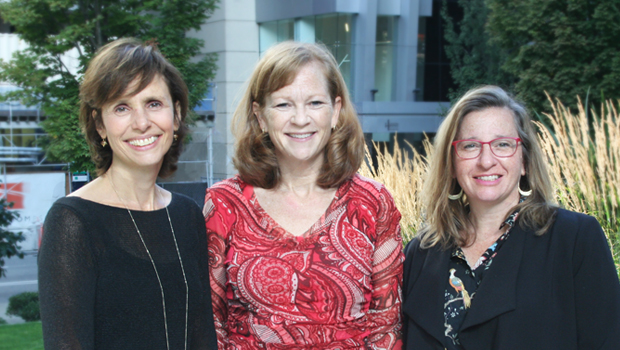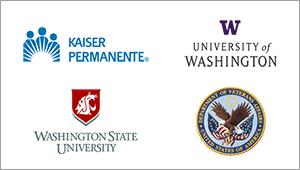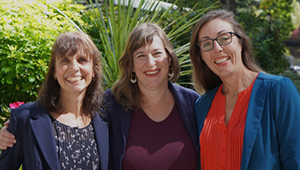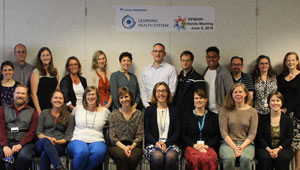CATALyST K12 Scholar Program: A spark for future LHS researchers

CATALyST program directors Drs. Paula Lozano (left) and Diana Buist, with program administrator Susan Brandzel (right).
Drs. Diana Buist and Paula Lozano are leading a statewide collaboration to train the learning health system researchers of the future
What do you get when you combine 2 patient-centered funding agencies, 4 of Washington state’s leading research institutions, and more than 50 scientists with expertise in learning health system (LHS) research? You get CATALyST—a unique K12 scholar program designed to train and mentor the next generation of LHS researchers.
LHS research is a rapidly growing field that has the potential to help transform health care nationally. Its goal is not just to generate evidence about health care delivery—but to inform action and decision making at the system level to improve quality, value, equity, and patient health. By embedding scientific inquiry in real-world health systems, LHS research accelerates the translation of promising research findings into practice and shines light on practical, affordable ways to improve outcomes across diverse populations.
How CATALyST is helping fuel the future of LHS research
Freshly launched in September with funding from the Agency for Healthcare Research and Quality (AHRQ) and the Patient-Centered Outcomes Research Institute (PCORI), the CATALyST K12 Washington LHS Scholar Program aims to provide experience and training to early-career scientists who want to pursue LHS research. It is 1 of 11 LHS Centers of Excellence funded by AHRQ and PCORI* as part of a joint, 5-year, $40 million initiative to train clinicians and research scientists to conduct patient-centered outcomes research within LHSs.
The CATALyST program brings together four health systems with deep expertise in embedded, translational research: Kaiser Permanente Washington, the University of Washington, the Veterans Affairs Puget Sound Health Care System, and the Washington State University College of Medicine. Leading the program are two senior investigators from Kaiser Permanente Washington Health Research Institute (KPWHRI): Diana Buist, PhD, MPH, KPWHRI’s director of research and strategic partnerships, and Paula Lozano, MD, MPH, associate medical director of research and translation at Kaiser Permanente Washington.
In addition, the CATALyST faculty includes more than 50 LHS scientists and mentors from diverse clinical and research disciplines across the four collaborating institutions.
“With CATALyST, we’ve assembled an experienced group of mentors who have demonstrated a longstanding commitment to training and with a broad range of expertise,” says Dr. Buist. “Like Kaiser Permanente Washington, our three partner organizations have robust research programs and growing LHS laboratories. We are excited to formalize a new training partnership with Washington State University College of Medicine.”
What does that mean for CATALyST scholars? In addition to training and mentoring, they will have the opportunity to contribute to new and ongoing LHS studies at one or more of CATALyST’s partner organizations. Through this hands-on experience, scholars will begin developing expertise in the foundational elements of LHS research—including collaborating with care delivery partners, identifying opportunities to improve patient-centeredness, and using cutting-edge methods to rapidly implement evidence into practice.
CATALyST scholars who are selected to train at Kaiser Permanente Washington will also have the opportunity to engage with the organization’s formal LHS Program. Established in June 2017 by Kaiser Permanente Washington leadership, the LHS Program integrates and aligns research and care delivery to drive continuous learning and help the organization achieve its goals related to quality, access, service, and member experience.
“In its first year, Kaiser Permanente Washington’s LHS Program illustrated how leveraging key research capabilities—such as advanced analytics and implementation expertise—can help health systems find ways to better serve and care for patients,” says Dr. Lozano, who co-leads the program with KPWHRI’s Katie Coleman, MSPH, and Emily Westbrook, MHA. “It’s a real-world example of researchers and operational leaders in care delivery working together in a strategic way to continually improve.”
What’s next for CATALyST?
Over the next 5 years, CATALyST will recruit up to 8 scholars. The first cohort will be comprised of up to 4 scientists. The second and third cohorts, with 2 scholars each, will be recruited in the summers of 2020 and 2021. The application process for the first cohort is already underway.
“We hit the ground running as soon as our funding was announced last month,” explains CATALyST Program Administrator, Susan Brandzel. “Within a few days of launching recruitment, we started receiving many enthusiastic inquiries from a diverse range of candidates.” Announcement of the first 4 scholars will occur by the end of the year.
“It’s exciting that LHS research has been recognized as an area that warrants formal training and investment,” says Dr. Buist. “We are committed to working across the other LHS Centers of Excellence across the country to accelerate the efficiency and effectiveness of LHS research by training the next generation of leaders in this growing field.”
*Two other Kaiser Permanente regions are also involved in LHS Centers of Excellence funded by AHRQ and PCORI: Kaiser Permanente Northwest is part of Oregon Health and Science University’s NW Center of Excellence & K12 in Patient Centered Learning Health Systems Science; and Kaiser Permanente Southern California is part of the University of California, Los Angeles Stakeholder-Partnered Implementation Research and Innovation Translation (SPIRIT) program.
--by Jessica Ridpath
Learn More

CATALyST K12 Washington Learning Health System Scholar Program
An exciting opportunity for early-career health services scientists who want training in learning health system (LHS) research.
Visit the CATALySt home page.
Questions about the CATALyST Program?
Contact: Susan Brandzel
CATALyST Program Administrator
Susan.X.Brandzel@kp.org
206-287-2380
ACT Center

New center focuses on equitable, whole-person health care
Kaiser Permanente launches the Center for Accelerating Care Transformation.
Learning Health System

How the LHS Program helps us be best at getting better
One year in, leaders of Kaiser Permanente Washington’s Learning Health System Program describe how research-care delivery partnerships drive continuous learning.
Read it in Healthy Findings.



